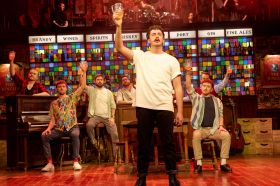Travel for work doesn’t need to be difficult. Photo by JESHOOTS.COM on Unsplash
When you start reciting the airline safety notice in your sleep then you’re probably travelling a little too often for work. For anyone who does it regularly, travelling for work can soon become a travail. I asked some of the sector’s frequent flyers for their tips on looking after your mental health when working away.
Keep your routines
Most regular travellers suggest keeping a routine when you’re away – whether that’s for diet, work or just staying in touch with family. As CEO of Critical Stages Touring, Chris Bendall often travels with theatre shows and finds routines helpful when he’s away.
‘Keeping regular routines and work life balance is important. At home I’m very conscious of not checking my emails [at night], but when you’re on tour it’s too easy to check your emails at 10pm,’ Bendall said.
He tries to keep the family routines when he’s not at home – both for his family and his own mental health. ‘In the mornings I try and have breakfast with my kids, which is difficult in a different timezone, but the morning routine has always been key. So I do a Skype breakfast then I try to have “my time”. I’m sitting at a table in Karratha or Dubbo having my breakfast and they are having theirs.’
That “my time” is essential for Bendall as he uses the time that he might have been making school lunches at home to do something for himself – such as going for a run to orientate himself and limit the amount of time he’s spending checking those emails.
Aware that working can become all consuming when travelling for business, Bendall plans things to do in the evenings to protect himself from the “always on” schedule. ‘At the end of the day, I plan something else at night so I’m not going back to the hotel and working. I try to close down the laptop at the time I normally would,’ he said.
‘The major thing is not making any major life changes when you’re going on tour. We tell our artists don’t give up smoking or drink too much.’ Chris Bendall, CEO Critical Stages Touring.
It is advice that he gives to casts and other performers on tour: keep your life as close to normal when you’re away and don’t put additional new pressures on yourself. ‘The major thing is not making any major life changes when you’re going on tour. We tell our artists don’t give up smoking or drink too much,’ he said.
Pack bright: two contrasting approaches
For some the most stressful part of travel can be working out what to cram into a carry-on. Artist, publisher and blogger Bobby Graham likes to keep it simple, with her Planepack website promising a method to ‘pack your awesome wardrobe into a carry-on bag’.
Graham works her wardrobe hard to limit her baggage and have a hassle-free trip without dragging much with her. ‘I really have a pared down wardrobe so I might use some jewellery at night to make an outfit look different. I only wear two colours at any time because it is so easy to mix and match your outfits.’
The old advice on packing light is packing only what you need – then halve it. Graham closely examines everything she packs to ensure it has more than one use. A good example is her strict rule on footwear. ‘My policy is only one pair of shoes – so you can walk in them and go out in night. At a push I would have a [second] pair of lightweight sandals if I was somewhere sunny.’
Bendall is more forgiving when he packs. ‘It’s the balance between being prepared and streamlined – I pack for all weather and then work out how good it is to have an overnight bag versus having everything I need.’ He does believe in being organised in advance though and prepares a ‘technology bag’ for chargers, international adapters and powerpacks. ‘I rarely unpack things – my toiletries bag is always ready,’ he confessed.
Arriving prepared is more important for Bendall than having light luggage. ‘I have lots of different food intolerances so I try to not to change my routine and I bring my own breakfast cereal, my own healthy snacks rather than spend all my time in supermarkets when I get there.’
A good way to reduce stress around packing can be to acknowledge that you can buy many essentials when you get there. This can create the odd ‘accidental souvenirs’ like underwear bought in Spain when you ran out, or a power adapter from Wagga Wagga. Bendall agreed about accidental souvenirs: ‘There is part of me that goes if I do I forget to pack something there is always the danger of airport specials. If I did forget that blue jumper then they are also on special at the airport.’
One of my earliest travel trials was miming ‘sore throat’ to a chemist in Rome which the pharmacist laughed at then thought I was choking in his shop.
Of course the downside of accidental souvenirs can be that you may not be able to find specific needs where you are away. One of my earliest travel trials was miming ‘sore throat’ to a chemist in Rome which the pharmacist laughed at then thought I was choking in his shop. So medications and other essentials should be prioritised when you’re packing but you’ll always forget things.

Travelling light or the just-in-case kitchen sink approach – everyone packs their own way. Photo by Franz Spitaler on Unsplash
Tech trials
These days it seems finding a charging place for a depleted phone battery can dominate your travels. ‘I find myself searching for power points at conferences and always get annoyed when someone else gets there first,’ Graham laughed.
To avoid the constant sharking for charge points, Graham minimises what she does on her devices. ‘I start the day in the low battery mode. You can’t rely on long haul flights to be able to charge your phone because all planes are different.’
Bendall recommends bringing along powerpacks. For Graham it’s about getting a device that can be as flexible as her wardrobe. ‘Taking your business artefacts on your phone is helpful – your presentation, your podcasts, your [reference] books. I’ve totally limited the technology I travel with so I no longer take a laptop because my phone can hold podcasts, sketching tools but also my banking and other business tools.’
Skipping inflight angst
Another point of pain for most business travellers is that dreaded long-haul flight. For Australian touring artists, long flights are necessary for tours, conferences or exhibitions that represent an essential professional development but – along with the cost of the actual flight – the idea of being stuck on a plane for 10+ hours can be a real barrier.
I reached out to travel writer and senior copywriter with Icelandair, Carolyn Bain to see how she how she survived the long-haul flights. Bain regularly travels the 20+ hour flight between Europe and Australia to visit family but has also written guidebooks for USA and Scandinavia.
‘Long-haul flights are a killer,’ Bain admitted. ‘My essentials are a window seat, a pashmina wrap and noise-cancelling headphones.’ Bendall agreed on the noise-cancelling headphones but not for inflight movies.
Bendall said, ‘A good long flight is productivity gold – grant applications, board reports … I have a good soundtrack downloaded so I don’t have to tune into anything else that is going.’ Bendall packs his own snacks ‘because airplane food is usually so unpredictable for me’.
Bain offered another diet tip for the flying. ‘Dehydration is the worst on flights, so lip balm and hand cream are essential.’ Staying hydrated is often a good way to beat jetlag when you arrive at your destination.
Like Bendall and Graham, Bain has her own routine for coping with inflight meals. She said, ‘A tip I learned from watching a TV show about Heston Blumenthal’s attempts to prepare tasty onboard food: nasal spray will stop your nasal passages from drying out onboard (and food will taste better). It might be a placebo but I feel better for it.’





